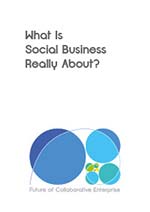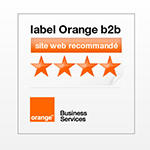 For once, I would like to tell you a little story. When, my wife and me, we arrived the other day at our country house, we found a little letter from our water supply company in the letterbox. It merely said that, having been unable to read the meter for several years, they had cut water supply. The water meter, which is located inside the garden, thus behind a closed gate, is usually read once a year. Before we met, my wife lived there for several years, but we now occupy the house only for weekends and some holidays. Needless to say, we keep on consciously paying the monthly bill based on the last meter reading, and, frankly, as our water consumption seriously decreased, I guess that the water company owes us a bunch of money back.
For once, I would like to tell you a little story. When, my wife and me, we arrived the other day at our country house, we found a little letter from our water supply company in the letterbox. It merely said that, having been unable to read the meter for several years, they had cut water supply. The water meter, which is located inside the garden, thus behind a closed gate, is usually read once a year. Before we met, my wife lived there for several years, but we now occupy the house only for weekends and some holidays. Needless to say, we keep on consciously paying the monthly bill based on the last meter reading, and, frankly, as our water consumption seriously decreased, I guess that the water company owes us a bunch of money back.
The problem is the company’s representatives never work on Saturday, and there is no way to communicate the index remotely or by whatever other method conceivable: online, by phone, by mail or by carrier pigeon. Furthermore, meter reading is usually done in July, when many people are away from home. Access to water being an inalienable right, French law provides the obligation to provide people who don’t pay their bill with a limited access; yet, there is no such a law for the inability to read the meter for two consecutive years, so they just cut the water supply.
July was really hot here, and since we had no way to wash dishes or take a shower, we decided to live the place. The house is located in a small village, where everyone more or less knows each other, and my wife was also member of the City Council while she lived there all year round. On our way back, we passed by the village hall, in front of which stood the mayor and some other people. We stopped to say hello, and told them our stupid story. “So you paid the bill?”, said the mayor, “it’s crazy that they cut the water supply. Don’t worry, we have the wrench to open the stopcock. Wait for me, I’ll open it for you.” A few minutes later, he was back with a huge T-shaped wrench, and water was soon able to flow again…
A tidal wave called life
This little story, I guess, perfectly illustrates today’s world and the environment we all live in. On one side, organizations, crippled with rigid operational procedures and abstract business processes, are losing grasp of their customers’ behaviors, needs and expectations. On the other side, we are more and more organizing into informal local networks, overcoming the structural deficiency of the organizations supposed to provide us with the basic services we rely on (think of banks, energy supply, telcos, real estate, transportation; think of governments, public agencies; think of the latest customer service hell you experienced). We connect, interact, borrow, share, help each other according to our capabilities and goodwill. Local communities are the new black, as Jon Husband just commented on Facebook. They are our answer to the uncertainty and complexity of the world we live in. In fact, they always were. From immemorial ages, people have gathered into tribes to survive into hostile environments. While social media adds a new, global and instantaneous, dimension to our need of belonging, it yet only represents the foam of a deep and seething phenomena: a tidal wave called life.
Many organizations have grown in a world of certainty and regularity which doesn’t fit ours any more. Most business behaviors are still built for an era of standardized consumption and predictable growth. Productivity, competitiveness, profitability, all these words which govern the corporate realm, have a strong flavor of linearity which is no more relevant in our tomorrow-is-really-another-day age. Blindfolded by their own survival, many organizations have lost contact with the real world, and the gap is widening between the way they operate and the way their customers live. Not only is this behavior a structural fallacy, but it is also an economical suicide. Millions, if not billions, are wasted everyday on useless and nonsensical procedures; in my little story, we were charged for the intervention of the representative who closed the stopcock, but the fine hardly covered the time spent (he surely had to look for the stopcock, hidden into vegetation, for a while), the gas burnt and the depreciation of the car, it was clearly a lose-lose situation.
Local communities, not customers
Customer experience and big data are becoming hot topics, meaning that organizations are beginning to realize that things are getting wrong. Alas, they are still trying to feed new insights into old mechanisms: behavioral targeting is much less about behaviors than it is about targeting, and social media is merely a new fancy route to customer service hell. For sure, businesses know their customers better and better, as we are leaving more and more footprints online, and as the technology required to correlate all this data is at our disposal. But is knowing the same as… understanding? Definitely not.
One doesn’t learn cabinetmaking in a book. Like with any craft, you have to watch a cabinetmaker working, to talk with him, to try by yourself under his supervision, to fully understand what he does and why he does that. The same holds true with customers. To understand them, organizations will have to walk with them to learn what jobs they are trying to get done. Most businesses have to redesign the way they conceive and think of service, to connect back to the real world and provide their customers with meaningful products and services. As recently wrote Helen Clarkson, Director of the Forum for the Future:
“But overall we know that our current economic paradigm is not sustainable. That’s why at Forum we talk about creating #theBIGshift – a change to a new paradigm. This means finding ways for the washing machine manufacturer to find a sustainable business model (leasing the machines and being the recipient of my quarters, for example) rather than panic and send out the salesmen.”
But, albeit necessary, this alone isn’t sufficient. Our present view of the rise of a new sharing economy is still tainted with precepts from the past. Instead of thinking about customers, we should start to think about the local communities which form to compensate for businesses’ inability to adapt to their customers’ expectations. Instead of selling, renting, or whatever-business-modeling TO them (old marketers’ reflex die hard), businesses should reshape themselves into thin organizations, in order to build business WITH them. What if, instead of wasting money because of obsolete procedures, our water providing company had delegated to local governments the power to turn supply on and off? What if, instead of considering local communities as customers, organizations begin to support them actively, considering them as active stakeholders of a more sustainable economy?






I’m somewhat dumbfounded that you’ve written this Thierry. I’ve been coming to the same conclusion lately, about how as citizens of the world and as business enterprises, we need to think smaller, more communally. Where individuals in a “network” (could be a small village or a multi-national) need to increase personalization, increase knowledge-sharing, discover shared purposes, build empathy, and improved distributed outcomes for every node in the network. I had to take a long day trip this weekend with my daughter’s French boyfriend whose aristocratic family has a long history dating back to the era of Charlemagne. In his village, there are only several hundred people. It made me wonder, with today’s ubiquitous access to information, resources, and connectivity, if we all might be better off by thinking smaller, building sustainable economies with highly enlightened principled leaders who realign priorities away from the self and more toward the whole. I’m just waxing philosophic after a long weekend, but thanks for sharing this. More to think about.
Great minds think alike 🙂 Your comments are always pushing my thinking forward, Susan. “Waxing philosophic”… maybe, but when considering things at a larger scale, the place taken by large organizations in our life terribly looks like the one taken by technology. You know, this “new shiny object” syndrome. We used to consider them as the solution to all and every problem some 150 years ago, then spent our time feeding them with new features and marvelled at the way they empowered us. It might be time to get past this novelty effect, and to look at ways to integrate them into the way we lived before them.
What mainly prevents us from doing so is finance. But as the “real” economy represents only less than 7% of financial exchanges, wouldn’t it be a way to disconnect both? In local communities, empathy and shared purpose are the building blocks of many things, a fiduciary economy (a world that disappeared from the financial planet). I remember the eighties, when there were two currencies in China: one for day-to-day and internal exchanges, another one for foreigners and “serious” business. Would that be a way out? I don’t know, but the rise of alternative currencies is certainly something to watch and stimulate very closely.
I remember the Foreign Exchange Certificates (FEC) in China, we called it “funny money” back then. It created a huge imbalance (foreigners selling it, locals wanting it) in black market exchanges. Maybe it was a good learning experience, do you really need the stuff that FEC could buy?
Hi Joachim,
We similarly called it “monnaie de singe” in French. If I remember well, FEC were the only currency usable in state-managed outlets, thus used by local to buy “bourgeois” goods, TV sets and so forth. Other times, other context… My comparison is for sure a bit far-fetched, but can we keep on trying to move to a more sustainable economy while keeping two different systems (goods and services exchanges, on one side, and purely financial expectations for the other) together? Splitting bank activities is already on the agenda here and there.